American History for Truthdiggers: Roots in Religious Zealotry
For the Puritans of the Massachusetts Bay Colony, a harsh faith justified executing “witches” and burning living Native American women and children.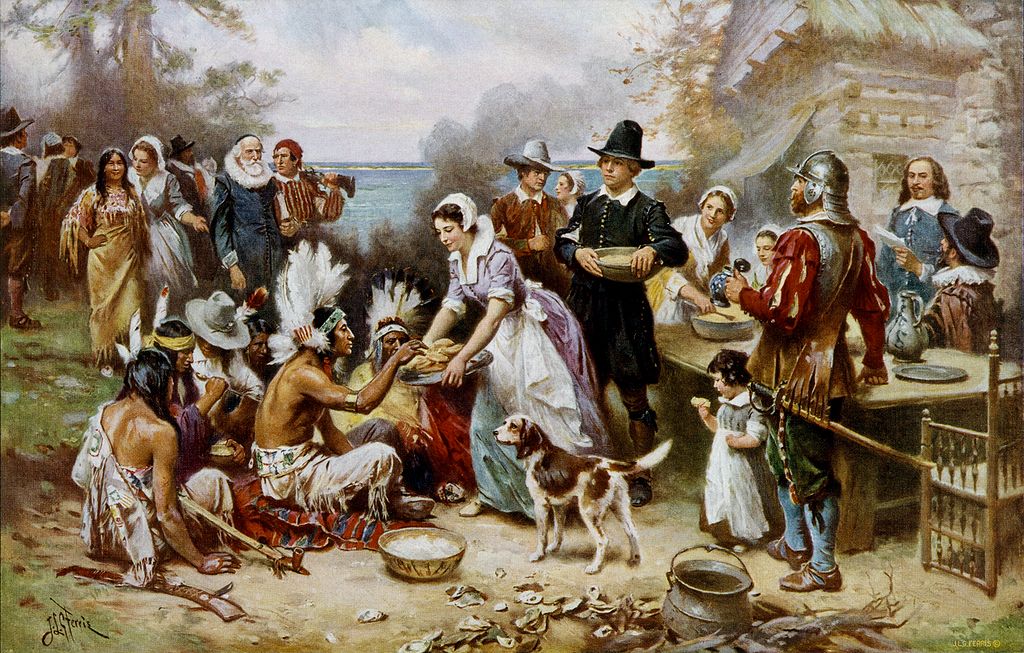 “The First Thanksgiving, 1621” by J.L.G. Ferris. The Pilgrims of first-Thanksgiving legend were soon followed to the New World by the Puritans, who established the Massachusetts Bay Colony. (Library of Congress / Wikimedia Commons)
“The First Thanksgiving, 1621” by J.L.G. Ferris. The Pilgrims of first-Thanksgiving legend were soon followed to the New World by the Puritans, who established the Massachusetts Bay Colony. (Library of Congress / Wikimedia Commons)
Truthdig editor’s note: The past is prologue. The stories we tell about ourselves and our forebears inform the sort of country we think we are and help determine public policy. As our current president promises to “Make America great again,” this moment is an appropriate time to reconsider our past, look back at various eras of United States history and re-evaluate America’s origins. When, exactly, were we “great”?
Below is the second installment of the “American History for Truthdiggers” series, a pull-no-punches appraisal of our shared, if flawed, past. The author of the series, Danny Sjursen, an active-duty major in the U.S. Army, served military tours in Iraq and Afghanistan and taught the nation’s checkered, often inspiring past when he was an assistant professor of history at West Point. His wartime experiences, his scholarship, his skill as a writer and his patriotism illuminate these Truthdig posts.
Part 2 of “American History for Truthdiggers.” / Click here to see the first installment in the series.
It is the image Americans are comfortable with. The first Thanksgiving. Struggling Pilgrims—our blessed forebears—saved by the generosity of kindly Native Americans. Two societies coexisting in harmony. If Colonial Virginia was a mess, well, certainly matters were better in Massachusetts. Here are origins all can be proud of.
Our children re-create the scene every November, and we watch them with pride through the lenses of our smartphones. But is this representation of life in Colonial New England an accurate portrait of Anglo-Native relations at Plymouth, or, for that matter, in the larger Massachusetts Bay Colony? Of course it isn’t, but nonetheless the impression—the myth—persists. That’s a story unto itself.
Consider this: How many Americans even know there was a difference between Pilgrims and Puritans? The distinctions matter. The Pilgrims, of course, arrived first. Calvinists of humble origins, the Pilgrims were Protestant separatists who believed the mainstream Church of England was beyond saving. They fled England for the Netherlands in the early 17th century, and then, in 1620, about a hundred boarded the Mayflower to go to North America. It was they who landed on Plymouth Rock.
The far more numerous Puritans were also pious, dissenting Protestants, but they initially believed the Church of England could be reformed from within. They were generally wealthier, more prominent citizens. In about 1630, about 1,000 Puritans formed the first wave to settle the area claimed by the Massachusetts Bay Colony. They were, indeed, fleeing the persecution of King Charles I, but—unlike the Pilgrims—they received a royal charter for their colony. They hoped to found a “New Jerusalem” in the New World.
Stark Contrasts: Virginia vs. New England
These weren’t the gold-hungry aristocrats of Colonial Virginia. The Puritans (and Pilgrims) came as families—they included women. The Massachusetts climate and natural population growth made for far lower mortality than that experienced at early Jamestown in Virginia. Everyone was willing to work, and the productive family units made, eventually, for bountiful harvests. This was not a land of “gentlemen” and cash crops, as in Virginia, but of dutiful families tilling the land.
The motivations and origins of the two English colonies affected the social structure of each. Differing goals set the tone from the first. Virginians sought to exploit the land, mine its resources, compete with the Spanish and turn a quick profit. Not so the Puritans. They strove to settle, to put down roots and thrive in an idealized community. Their middling origins combined with communal goals and resulted in familial plots with widespread land ownership—another contrast with the tobacco plantations of Jamestown. All this translated into a rough economic equality, at least in the early years. There was also a near total absence of chattel slavery: The climate didn’t support the most common cash crops, and so there was little incentive to import Africans to New England.
God Wills It: The Motivations of the Puritans
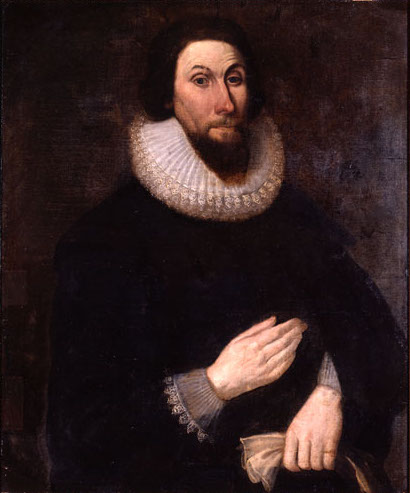
It all sounds harmonious, idyllic even. Yet something lurked below the surface, something dark and unpleasant to modern eyes. These were fundamentalist zealots! These insufferable, millenarian Calvinists held themselves in shockingly high esteem. They were chosen, they would transform the world by their example. If the Pilgrims sought separation from a world of sin, the Puritans meant to create a New World, an example for all to emulate. It briefs well, and makes for an agreeable origin narrative, but isn’t there something disturbing about such a people, about such overbearing confidence?
Ponder the words of John Winthrop, an early governor of the Bay Colony:
… wee shall find that the God of Israel is among us, when ten of us shall be able to resist a thousand of our enemies, when he shall make us a praise and glory, that men shall say of succeeding plantations: the Lord make it like that of New England: for we must Consider that we shall be as a City upon a Hill, the eyes of all people are upon us. …
These were people on a mission, the Lord’s mission, come what may. Such people would seem to be on a collision course with the region’s natives and Anglo nonconformists. And this would soon come to pass.
The Puritans’ motivations and goals raise some salient questions. What does it say about, and what are the implications for, a society founded on such colossal self-regard? Is it, ultimately, a good thing? That’s certainly a matter of opinion, but the questions themselves are instructive. Americans must make such queries to get an honest sense of themselves and their origins. This much is hard to argue with: Here, in Massachusetts, we find the geneses of American exceptionalism—the blessing and curse that has shadowed the United States for more than three centuries, driving domestic and especially foreign policy. Divergent modern political figures, from Ronald Reagan to Barack Obama, stuck carefully to an American exceptionalist script, in rhetoric if not in deed. One wonders whether this “City on a Hill” milieu, on the whole, has been a positive attribute. This author, at least, tends to doubt it. Perhaps we should mistrust such pride, and conceit, in even its most American forms.
Stifling Dissent: Life in Colonial New England
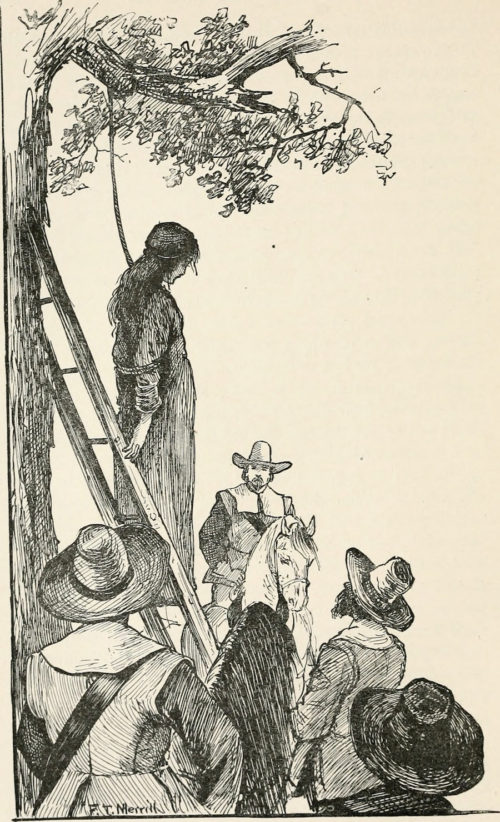
Could you imagine living with these people, comporting with their way of life? It sounds like a nightmare. Yet we Americans hold these antecedents in high esteem. Perhaps it’s natural, but this much is certain: Such veneration requires a certain degree of willful forgetting, a whitewashing of inconvenient truths about Puritan society.
Sure, Massachusetts avoided the worst famines of Jamestown’s early years, but life in Colonial New England was far from serene. It rarely is in repressive religious societies. Remember, the Puritans constructed exactly what they said they would, a theocracy on the bay. The Massachusetts Bay Colony may indeed have more in common with modern Saudi Arabia—executing “witches” and “sorcerers”—than it does with contemporary Boston. Our ancestors were far more religious than most Americans can fathom. But there’s also a problem of framing; we’ve omitted the uncomfortable bits to fashion an uplifting origin narrative.
There were many subgroups that certainly didn’t enjoy life in early Colonial Massachusetts: religious dissidents, agnostics, free thinkers and, well, assertive women. We’ve all heard of the infamous Salem Witch Trials, but nearly four decades earlier the widow Ann Higgins was executed, hung for witchcraft, after having the audacity to complain that hired carpenters had overcharged her for a remodeling job on her house.
All told, 344 citizens were accused of witchcraft in 17th-century Massachusetts. Twenty were executed. The accused had commonalities that are indicative of the nature of gender relations in the Bay Colony. Seventy-five percent were women. Most of those women were middle-aged or older and demonstrated some degree of independence. Many were suspected of some sort of sexual impropriety. The point is that Colonial New England was inhabited by zealots—conformist and oppressive fundamentalists who strictly policed the boundaries of their exalted theocracy. Forget the Thanksgiving feast: This was Islamic State on the Atlantic!
If life was as idyllic as the settlers intended in hail-the-Protestant-work-ethic Massachusetts Bay, then why were so many colonial “heroes” kicked out? Roger Williams, for example, founder of Rhode Island, promoted religious toleration and some separation of church and state, and asserted (gasp) that settlers ought to buy land from the native inhabitants. His thanks? A ticket straight out of Massachusetts. Slightly less well known was Anne Hutchinson. She had the gall to organize weekly women’s meetings to discuss theology and even contemplated the concept of individual intuition as a path to salvation. She too was banished. There was simply no room for dissent in Puritan society.
‘We Must Burn Them’: Puritan and Native Relations
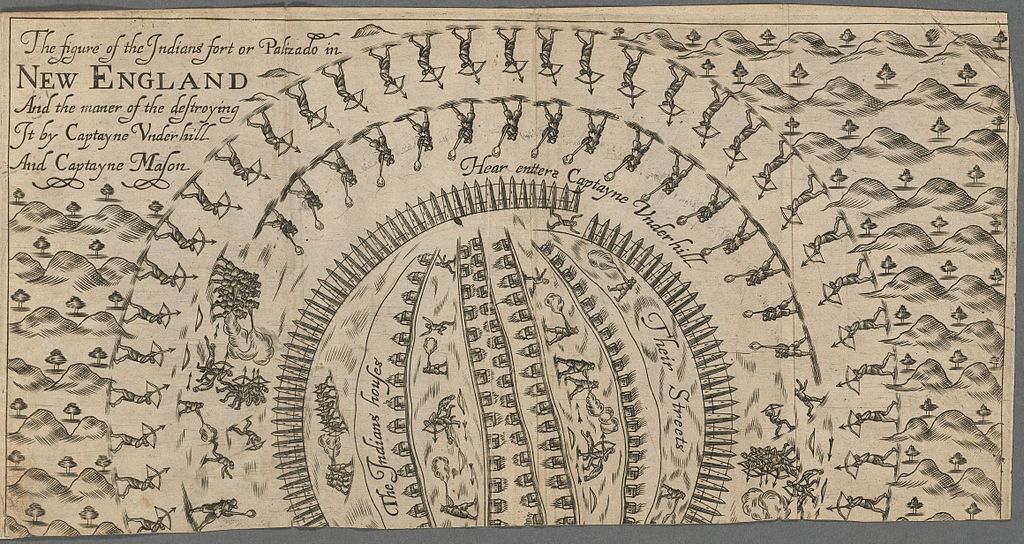
This, naturally, brings us to the native peoples of New England. If nonconformist Englishmen fared so poorly in Massachusetts, then what of the Indians? You can probably guess.
Once again, as in Virginia, the Native Americans did not, or could not, wipe out the nascent colonial community, even though, initially at least, there were fewer soldiers among the settlers in Massachusetts. The explanation for the settlers surviving among the native Americans is far more complex than the simple myth of the noble, benevolent savage. The Puritans were the “beneficiaries of catastrophe,” for New England native communities had recently been ravaged by infectious European diseases that spread up and down the coastline. The thinned-out native populations thus posed less of a demographic threat to Massachusetts.
Far from the serene images of Thanksgiving amity, Anglo-Indian relations quickly turned from bad to worse. Land was a factor, but not the only one. A permanent settler community such as the Puritans’ would require inevitable expansion and rapidly grow, to be sure. As in Virginia, land ownership cohered with “freedom”—Anglo land and Anglo freedom, that is. Still, in New England, ideology was as much of a stimulus for war as land, wealth or further economic motives. The native tribes, swarthy and “unbelieving” Pequot, Wampanoag, Naggaransetts and others, simply did not fit into the Puritan’s messianic worldview. Conquered or converted were the only acceptable states for local Indians.
Early colonial wars in Massachusetts were as brutal and bloody as wars anywhere else on the North American continent. Here there was a direct connection between the Puritan religion and the cruelty seen in the Pequot War and King Philip’s War. In the Pequot War, Massachusetts militiamen attacked a native fort at Mystic, Connecticut, and through fire and fury burned alive 400 to 700 Indians, mostly women and children. The survivors were sold as slaves.
The militia relied on allied native scouts. Observing the ruthlessness of the Puritan fighting men, one native auxiliary asked Capt. John Underhill, “Why should you be so furious? Should not Christians have more mercy and compassion?” Underhill’s reply was as instructive as it is disturbing:
I would refer you to David where, when a people is grown to such a height of blood, and sin against God and man … sometimes the Scripture declareth women and children must perish with their parents; some-time the case alters: but we will not dispute it now. We had sufficient light from the word of God for our proceeding.
Should, from time to time, a tinge of doubt betray the Puritans’ devout certainty, faithful zeal quickly assuaged the guilty conscience. Consider the words of another participant in the “Mystic Massacre,” William Bradford: “It was a fearful sight to see them thus frying in the fire … and horrible was the stink … but the victory seemed a sweet sacrifice, and they gave the praise thereof to God.”
Nearly simultaneous to the Virginian Bacon’s Rebellion, the Puritans fought King Philip’s—or Metacom’s—War in Massachusetts. Mercilessly executed on both sides, this was a war of survival that forever broke native power and independence in New England. Nearly one in 50 colonists were killed in what was by far the bloodiest war in American history, with 11 times the death rate of World War II. The native leader Metacom, known to the settlers as King Philip, was betrayed by an informer and killed, and his head was displayed on a pole in Plymouth, Mass., for decades. Such was the savagery of colonial war that the tactics and symbolism bring to mind Islamic State in today’s Syrian civil war.
When it came to Native American affairs, the Puritans hardly set the “City on a Hill” example. Or did they? After all, John Winthrop believed the “God of Israel”—a jealous, smiting deity if ever there was one—was among the Puritans, guiding their every move. As noted here earlier, Winthrop claimed this God provided the colonists such strength that 10 of their number could “resist a thousand enemies.” Viciousness and intolerance toward racially distinct, heathen natives were actually at the heart of “City on a Hill” teleology from the start. What Americans now decry in the Greater Middle East is but an echo of their colonial past. That much is worth remembering.
Not So Different: What Virginians and New Englanders Shared
When considering the two origin-societies of Virginia and Massachusetts, the differences are stark and effortlessly leap forth. More difficult, but just as relevant, are their significant commonalities. For it is in the overlap that we find our shared heritage, that which is universal in the American past, and, perhaps, the past of all settler-colonial societies.
Anglo dominance—and arrogance—acutely pervaded both colonial civilizations. In Massachusetts, as in Virginia, conflict and brutality toward the native peoples were regular features of settler life. In each setting, though to differing extents, a fever for land combined with exceptionalist ideology to conquer slave and native alike. For Englishmen, property ownership corresponded with liberty, but all along the Eastern Seaboard, Anglo liberty portended native death and displacement.
The exceptionalism and chauvinistic Protestantism of the Massachusetts Puritans long influenced the American experiment. From the “City on a Hill” it is but a short journey to Manifest Destiny and the conquest of a continent—native inhabitants be damned!
Again, origins, and origin stories, matter. They inform who we were, and who we are, in stark contrast to who we’d like to think we were and are. America is its best self when it searches its soul and reforms from within. When, that is, it confronts its demons and seeks a better, more inclusive and empathetic future.
For further information on this period, see: ● Peter Silver, “Our Savage Neighbors: How Indian War Transformed Early America.” ● Jill Lepore, “The Name of War: King Philip’s War and the Origins of American Identity.” ● Alan Taylor, “American Colonies: The Settling of North America, Volume 1.”
Maj. Danny Sjursen, a regular contributor to Truthdig, is a U.S. Army officer and former history instructor at West Point. He served tours with reconnaissance units in Iraq and Afghanistan. He has written a memoir and critical analysis of the Iraq War, “Ghost Riders of Baghdad: Soldiers, Civilians, and the Myth of the Surge.” He lives with his wife and four sons in Lawrence, Kan. Follow him on Twitter at @SkepticalVet and check out his new podcast “Fortress on a Hill,” co-hosted with fellow vet Chris ‘Henri’ Henrikson.
(The views in this article are those of the author, expressed in an unofficial capacity, and do not reflect the official policy or position of the Department of the Army, Department of Defense or the U.S. government.)
Your support matters…Independent journalism is under threat and overshadowed by heavily funded mainstream media.
You can help level the playing field. Become a member.
Your tax-deductible contribution keeps us digging beneath the headlines to give you thought-provoking, investigative reporting and analysis that unearths what's really happening- without compromise.
Give today to support our courageous, independent journalists.


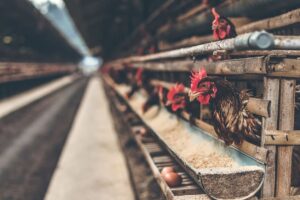

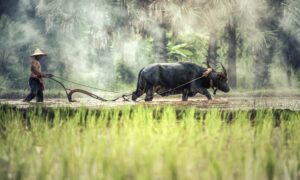

You need to be a supporter to comment.
There are currently no responses to this article.
Be the first to respond.